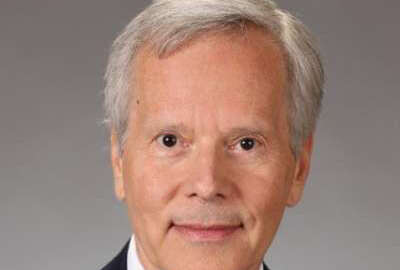
Contractors ponder their place in vaccine queue
The government couldn't function for very long without contractors. Does that mean contractor employees, or at least certain ones, ought to be eligible for COVID...
Best listening experience is on Chrome, Firefox or Safari. Subscribe to Federal Drive’s daily audio interviews on Apple Podcasts or PodcastOne.
The government couldn’t function for very long without contractors. Does that mean contractor employees, or at least certain ones, ought to be eligible for COVID vaccines? For one view, Federal Drive with Tom Temin turned to the president and CEO of the Professional Services Council, David Berteau.
Interview transcript:
Tom Temin: What’s your thinking here David, because most contractors are working remotely anyway. So do they qualify and what are some of the implications?
David Berteau: Well, Tom, a lot of implications. And we’re now entering, what, month 11 of work from home for the pandemic, with no clear date in sight in which we’re going to say, okay, we’re not doing that anymore, right. And so the question has already started to come up across the board ever since the vaccines were approved. Number one, in fact I’ve got four questions that I’d like to cover here. One is, will agencies provide vaccines? DoD is authorized to receive something like 11 million doses of the vaccine, other agencies have gotten a smaller number, but to take care of their own employees, particularly those who wouldn’t be able to get them on the open market. Overseas employees, for instance or particularly high risk folks as well. The Defense Department was the first one that issued very clear guidance on this because, of course, they’re holding those doses for military personnel and some civilian personnel. So their guidances have been out there since December now. And it actually provides for a limited number of contractors, principally those in what’s the category called contractors authorized to accompany the force, like everything in DoD, it has an acronym, CAAF. Those are folks who are with the military in forward deployed areas where there’s high risk, and obviously, you don’t want the military to get it from their contractors, you don’t want the contractor to get it from the military. So those are already authorized and they’re being administered. And in fact, local commanders have discretion with regard not only to giving it to US citizens who are contractors, but to host nation employees or third country nationals who also are in contact with the force. So the whole idea is to protect the military, the deployed military there. But few, if any other agencies have issued any public guidance. So then the second question is, will agencies require contractors to be vaccinated? As you point out, a lot of folks are working from home, so there’s a question of how urgent is it. But there are a whole lot of workers who perform tasks that can’t be done from home, you’re working on classified information in a secure facility, you’ve got touch labor job that you need to do to repair a part, maybe even it’s a part in a tight quarter on a ship. And so there’s a question to that. We’ve asked several agencies and so far the answer is generally no, we’re not going to require contractors to be vaccinated. And then the broader question that our members are wrestling with is, will companies require some or all of their employees to be vaccinated? The Equal Employment Opportunity Commission issued an update back in December that [clarified] that companies can in fact require employees to be vaccinated. But that doesn’t answer all the questions. Just the fact that you have that authority doesn’t mean that you exercise it. And what we think we know is vaccines seem to protect the individual, but we don’t yet know the extent to which they protect others. You could still potentially be contagious, even if not necessarily to yourself.
Tom Temin: Right, because the vaccines as we know them so far, don’t kill the bacteria. They just keep it from infecting you as the owner of it.
David Berteau: And then there’s another question, which is the fourth question, how would someone verify that a person’s been vaccinated? The Center for Disease Control issues this reminder card when you get your first dose that says come back in three weeks if you’re one brand and come back in four weeks, if you’re the other brand for your second dose. So that reminder card is sort of, okay, I’ve been vaccinated, at least I got the first dose. Other groups, the International Air Transport Association issued a notice that they’re going to provide a digital passport for air travelers. You can really get very complicated here quickly.
Tom Temin: Well, I guess they could always administer the vaccine with a tattoo needle, and then you would have a mark forever, or maybe a little sticker, yo vaccined.
David Berteau: But there are questions here, number one obviously of discrimination, and perhaps groundless discrimination, right. But there’s also questions of fraud and integrity of the process. You and I both know that there’s still a robust industry in fake IDs out there, right. In fact, it’s probably more robust than ever. So these are all questions and we’re working with our member companies on all these issues.
Tom Temin: And let’s switch gears here for a minute, because there is court rulings now and some precedents starting to take place on the executive order for combating race and sex stereotyping. What are you seeing? What are contractors doing now in light of recent court rulings that say that just can’t be valid?
David Berteau: Right. So the executive order issued last September had a couple of sections in it that applied to contracts and to grants, Section Four in particular applied to contracts and took effect November 21. And some agencies, the Defense Department and a couple other agencies issued a guidance memorandum that required that that language be incorporated, not only into new contract awards, but into solicitations. And then the Northern District of California back in late December right before Christmas issued a partial injunction on the implementation of that executive order for contracts and for grants. But the court order also extended to other parts. First of all, there was a question of how do you get it out of a solicitation? How do you get it out of a contract award that’s already in place? Well, the injunction says you can’t enforce it, it doesn’t actually say you have to take it out. So there’s still some bureaucratic and administrative questions that contractors have to go through there. But there was also a parallel piece, the Labor Department’s Office of Federal Contract Compliance Programs, OFCCP, had done two things. Number one is they had created a hotline where anybody could call in and complain about unconscious bias training that would perhaps be prohibited by the executive order or constrained by the executive order. And no contractor had any idea whether they had a hotline investigation underway, or what the status of that would be, because it was protected until such time as they issue something. Well, last week, in pretty much an unannounced and undated notice, the OFCCP issued a notice that they were going to suspend all investigations that were underway under this, in compliance with the court order. And we applaud this. And it isn’t that our member companies want to have improper guidance and training to their folks, it’s that it’s pretty important in today’s environment to be able to recruit and retain a workforce that, in fact, does have the amount of diversity and inclusion that you need to have in order to be competitive in the marketplace. Because we need, our company members need to be able to recruit the best talent in order to be able to do the best contract work. So we’re continuing to follow this as it’s implemented. Our suspicion, of course, is that the incoming administration may revoke this executive order. But we’ve been pointing out to them that just rescinding the executive order doesn’t remove the language from contracts, doesn’t stop the hotline investigations, doesn’t stop all the other pieces of this. And by the way, this is not just this executive order. This goes all the way back to the Civil Rights Act of 1965, Lyndon Johnson’s executive order, 11246, which is still enforced and actually does protect the integrity of the process.
Tom Temin: Right. Wouldn’t you most like for the administration, any administration’s stance to be federal contractors should comply with the same laws and regulations as everybody else instead of having special rules for just them?
David Berteau: That’s exactly right. And particularly if a company is involved, both in government contracting and in the broader commercial workplace, you’ve got to be able to comply across the board. And you’ve got to be competitive in terms of workforce.
Tom Temin: That’s right. I think people sometimes forget this all does date to 1964, and that that kind of discrimination has been against the law for a couple of generations now.
David Berteau: Right. My generation certainly since I was in high school.
Tom Temin: Alright, well, it’s going to be over one way or another, at least as it has been since September. So that whole issue seems to be just fading away as the administration drains away.
David Berteau: Right. But it’s important to recognize that for many of these administrative actions and executive order or rule, there’s a process that needs to be followed to undo them as well. It’s not just simply a signature that revokes it, you’ve really got to get at all the areas of implementation, you got to look at what makes sense, what do you need to do to walk it back. And of course, there’s the congressional role here, the Congressional Review Act, which remember was exercised almost 20 times by the 115th Congress at the beginning of the last administration. That may come into play as well. And we’re looking at PSC at what rules we would like to see rescinded under the Congressional Revie Act, and what rules we’d like to see retained in some way, shape.
Tom Temin: Alright, well, gonna be a lot of work to do in the next few weeks and months. David Berteau is president and CEO of the Professional Services Council. Thanks so much for joining me.
David Berteau: Thank you Tom. And you’re right, let’s keep working.
Copyright © 2025 Federal News Network. All rights reserved. This website is not intended for users located within the European Economic Area.
Tom Temin is host of the Federal Drive and has been providing insight on federal technology and management issues for more than 30 years.
Follow @tteminWFED
Related Stories

Contract spending reached 5-year high in 2020




